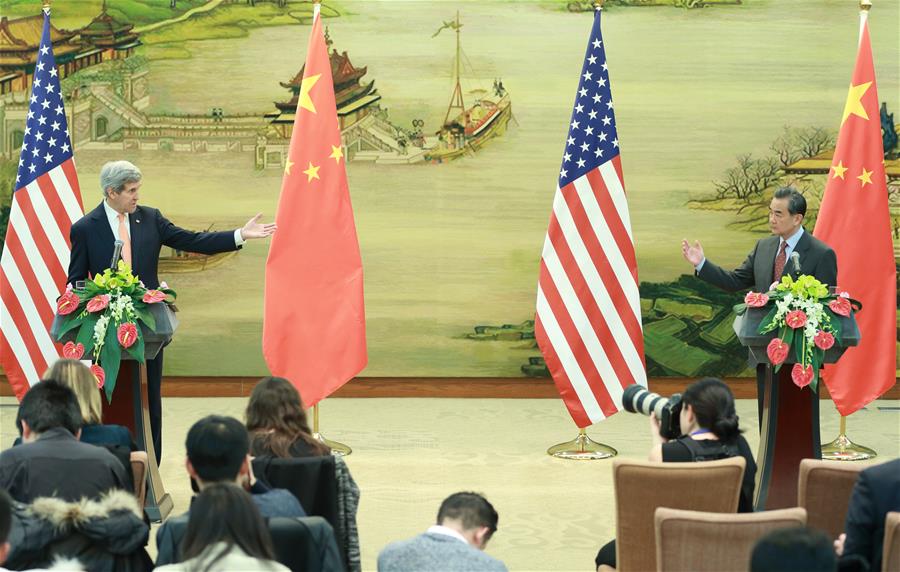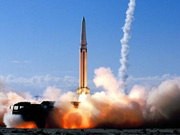


Chinese Foreign Minister Wang Yi (R) and U.S. Secretary of State John Kerry attend a joint press conference after their talks in Beijing, capital of China, Jan. 27, 2016. (Xinhua/Ding Haitao)
BEIJING, Jan. 27 -- Chinese Foreign Minister Wang Yi and U.S. Secretary of State John Kerry discussed the Korean Peninsula nuclear issue, the South China Seasituation and other hot-spot affairs during a meeting in Beijing on Wednesday.
Wang expounded on China's stance on several issues of common concern at a joint press briefing following their close-door talks lasting about four hours.
KOREAN PENINSULA NUCLEAR ISSUE
China agrees the United NationsSecurity Council should pass a new resolution on the Democratic People's Republic of Korea (DPRK) following its nuclear test earlier this month, Wang said.
"The new resolution should aim to bring the Korean Peninsula nuclear issue back to the negotiating table, rather than stirring up tension or causing chaos on the peninsula," he stressed.
Sanctions are not an end in themselves and it is vital to restart dialogue and negotiation, said Wang.
China is willing to maintain all-round and profound consultations with all parties in a responsible way, including the U.S., said Wang.
Wang said China's stance on the Korean Peninsula nuclear issue is clear, consistent and responsible, and will not be changed by any single incident or affected by sentiment.
China is committed to the denuclearization of the peninsula, maintaining its peace and stability, and resolving the issue through dialog and consultation, he said.
"China adheres to above-mentioned position and has made tremendous efforts over the years and fulfilled its responsibilities and obligations," said Wang.
"China refuses all groundless speculations and misinterpretations on its stance," he said.
SOUTH CHINA SEA
On the South China Sea situation, Wang urged the United Statesto be objective, fair and reasonable in the way it deals with the issue.
"On the islands and reefs stationed by China, we have built some necessary facilities for self defence. International law grants all sovereign states the right of self protection and self defence, and it has nothing to do with the so-called 'militarization'," said Wang.
Wang said the islands in the South China Sea have been China's territory since ancient times. China has the right to protect its territory, sovereignty and legitimate maritime rights and interests.
China is committed to maintaining peace and stability in the South China Sea, with dialogue playing an integral role in any dispute, and solutions achieved through peaceful negotiation, he added.
He said China and the United States should manage the sensitive issues in a constructive manner to prevent them from interfering the bilateral cooperation.
TAIWAN AFFAIR
The Taiwan issue is the core issue of China-U.S. relations and the U.S. should abide by the one-China policy, Wang said.
"No matter what changes occur in Taiwan, the basic fact that both the mainland and Taiwan belong to one China is unchanged and will not change," Wang said.
Sticking to the 1992 Consensus and opposing "Taiwan independence" is an important prerequisite and political basis for peaceful development of cross-Strait relations, Wang said.
He urged the United States to support the peaceful development of cross-Strait ties with concrete actions.
Kerry said that the U.S. will continue its one-China policy and encourage cross-strait dialogue.
PRAGMATIC COOPERATION
Wang and Kerry also touched on a slew of topics regarding pragmatic cooperation during their talks, according to an official press release.
China backs the U.S. to host a successful nuclear security summit on March 31-April 1 in Washington, D.C., Wang told Kerry, adding China welcomes President Barack Obamato attend the G20 summit in Hangzhou in September.
China is willing to work with the U.S. to continue a number of dialogue mechanism in the year ahead, said Wang, stressing China hopes the two countries will vigorously push forward negotiations for a Bilateral Investment Treaty (BIT).
China also wants to enhance coordination with the United States on macroeconomic and financial policies as well as global economic governance, he said.
Wang called on the two countries to actively expand cooperation in finance, nuclear power, aviation, infrastructure and other areas.
In addition, both sides should further cooperation in military-to-military ties, anti-corruption, cyber security and climate change, said Wang.
He also called on both sides to provide more convenience for people-to-people exchanges between the two countries.
Kerry said that the United States is willing to strengthen cooperation with China in economy, trade, military, people-to-people exchanges, anti-corruption and other areas.
Chinese President Xi Jinpingand State Councilor Yang Jiechi also met with Kerry, respectively, on Wednesday.
Day|Week

 Beautiful Chinese tennis player Wang Qiang goes viral online
Beautiful Chinese tennis player Wang Qiang goes viral online Chinese pole dancing master opens class in Tianjin
Chinese pole dancing master opens class in Tianjin The most beautiful town of snow in China
The most beautiful town of snow in China SWAT members hold romantic wedding in E China
SWAT members hold romantic wedding in E China Breathtaking scenery and simple lifestyle in Hainan
Breathtaking scenery and simple lifestyle in Hainan Finding sexiest underwear supermodels
Finding sexiest underwear supermodels Top 10 ancient pagodas in China
Top 10 ancient pagodas in China Chinese version of Victoria's Secret Show held in Hunan
Chinese version of Victoria's Secret Show held in Hunan Can you find out the sniper hiding in camouflage?
Can you find out the sniper hiding in camouflage? Spectacular rockets launch scenes
Spectacular rockets launch scenes